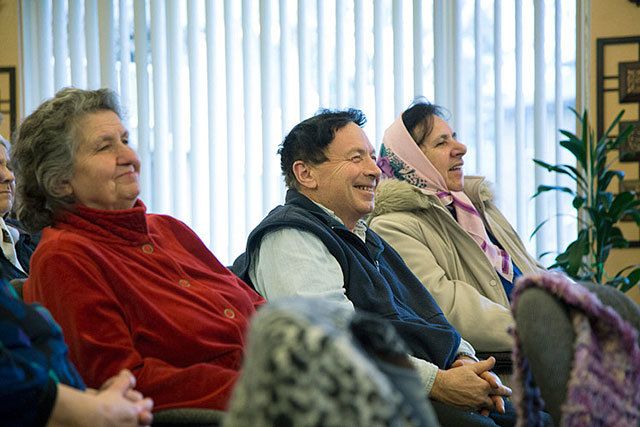On a recent Monday afternoon at the community room at Southwood Square Apartments in Kent, Natalie Kotar brings out her whiteboard and begins a conversation about healthy drinks – all in Russian. Here, she’s known as Natasha, an affectionate nickname in Russian for Natalie.
Public Health – Seattle & King County recently posted this story on its Public Health Insider blog about a health worker who speaks Russian helped out Kent residents.
The seniors living here have met in the community room, a few feet from the residents’ apartments for a round of chair exercise followed by an interactive discussion led by Natasha. She is one of several bilingual community health workers who are bringing prevention work directly to apartment complexes where people live.
While the health workers are hired by Mercy Housing NW, Neighborcare or Global to Local, they are based at public and affordable housing properties across Seattle and South King County. The model helps to break down some of the many barriers that low-income and immigrant communities face in accessing preventive health services such as difficulties with transportation, complexities of navigating the health system and customized health information in their own language.
Natasha is a shining example of a community health worker. It’s clear that she has built trusting relationships through the affection she shows to the residents. One way she does this is by honoring their time. As she says, “just because they’re seniors does not mean they don’t have schedules.”
She goes the extra mile to find out information that will be relevant to the specific health needs of the residents here, such as talking with other health professionals about the recommended amount of water seniors should drink to help them stay hydrated.
The programs are part of a regional health innovation project of the King County Accountable Community of Health to prevent chronic disease in low-income and immigrant communities while working to simultaneously turn the curve on health care costs. The project expands on data work by Public Health and the housing authorities to integrate affordable housing and Medicaid data to see how these programs can make a difference.
Nutrition information, access to health screenings and exercise classes seem to be making a difference. One gentleman shared that on a recent trip to visit family back in the Ukraine, he was very proud that for the first time, he could easily scale the several flights of stairs needed to reach his relative’s apartment.
How the model may bolster well-being
Comments from some of the men and women at the session point to how this model may be successful, in part, by breaking down social isolation.
“We were stuck in our apartments. I wasn’t sleeping well. Once I started coming to the group classes, life got more cheery and now I feel better – physically and emotionally.”
Social scientists have drawn the connection between social relationships and the impact on mental health, health behavior, physical health and even mortality. Social support can even reduce the impact of stress or foster a sense of meaning and purpose in life. Even one reliable source of social support can act as a buffer to stress.
“What is most important is that we know we have someone who cares for us. We are learning how to move, what to eat, what to drink. But we get to socialize at the same time. This gives us energy and strength to do something in a social setting.”
For others, having a companion to be active with may further facilitate a healthy lifestyle.
“Strolling is part of our culture. Now I can look around and find someone to walk around the area with.”
As the session with Natasha nears its end, the group breaks into laughter as Natasha holds up a plastic water bottle. (Natasha later explains they were joking about finding the sweet spot of how much water to drink to stay hydrated and healthy while not having to be “running” (to the bathroom) all the time. The laughter, connection and relevant health information may be just a few of the keys to this model.
More about the project
The Community Health worker initiative is led by Global to Local, Mercy Housing Northwest and Neighborcare, in partnership with King County and Seattle Housing Authorities and Public Health-Seattle & King County.
The program is funded by the Pacific Hospital PDA, Enterprise Community Partners, Communities of Opportunity and the Washington Health Care Authority. The project also incorporates data integration that builds on several years of work by Public Health – Seattle & King County, Seattle Housing Authority and King County Housing Authority, to connect Public Housing Authority and Affordable housing data to Medicaid data.
Talk to us
Please share your story tips by emailing editor@kentreporter.com.
To share your opinion for publication, submit a letter through our website https://www.kentreporter.com/submit-letter/. Include your name, address and daytime phone number. (We’ll only publish your name and hometown.) Please keep letters to 300 words or less.

